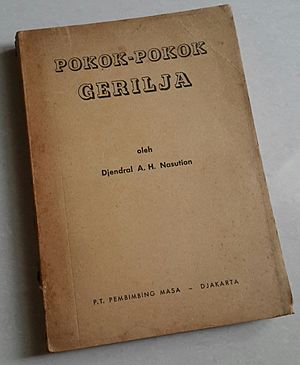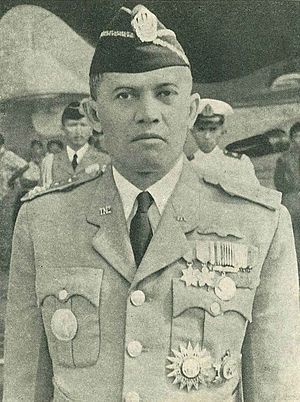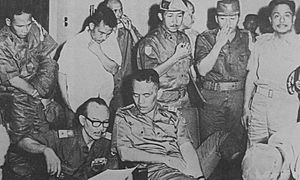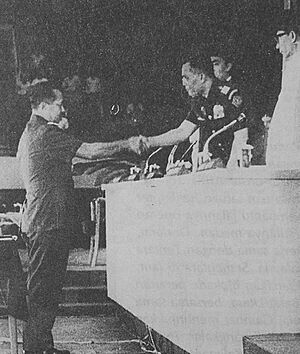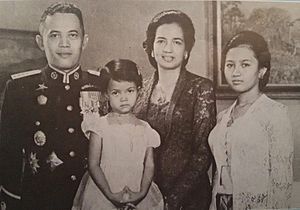Abdul Haris Nasution facts for kids
Quick facts for kids
General of the Army (Ret.)
Abdul Haris Nasution
|
|
|---|---|
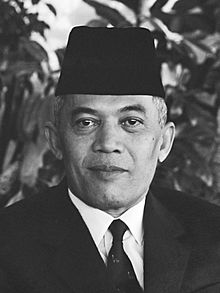
Portrait, 1971
|
|
| 2nd Speaker of the People's Consultative Assembly |
|
| In office 20 June 1966 – 28 October 1972 |
|
| President | Sukarno Suharto |
| Deputy |
See list
|
| Preceded by | Chaerul Saleh |
| Succeeded by | Idham Chalid |
| 11th Minister of Defense and Security | |
| In office 10 July 1959 – 22 February 1966 |
|
| President | Sukarno |
| Preceded by | Djuanda Kartawidjaja |
| Succeeded by | M. Sarbini |
| 3rd Commander of the Indonesian National Armed Forces | |
| In office January 1962 – March 1966 |
|
| President | Sukarno |
| Preceded by | ACM Soerjadi Soerjadarma |
| Succeeded by | General Suharto |
| In office December 1955 – July 1959 |
|
| President | Sukarno |
| Preceded by | Major General T. B. Simatupang |
| Succeeded by | ACM Soerjadi Soerjadarma |
| 2nd and 5th Chief of Staff of the Indonesian Army | |
| In office 1 November 1955 – 21 June 1962 |
|
| Preceded by | Major General Bambang Utoyo |
| Succeeded by | Lieutenant General Ahmad Yani |
| In office 27 December 1949 – 18 October 1952 |
|
| Preceded by | Colonel Djatikoesoemo |
| Succeeded by | Major General Bambang Soegeng |
| Personal details | |
| Born |
Abdul Haris Nasution
3 December 1918 Koetanopan, Dutch East Indies |
| Died | 6 September 2000 (aged 81) Jakarta, Indonesia |
| Cause of death | Stroke |
| Resting place | Kalibata Heroes Cemetery |
| Nationality | Indonesian |
| Spouse |
Johanna Sunarti
(m. 1947) |
| Children | 2 |
| Signature | |
| Nickname | Pak Nas |
| Military service | |
| Allegiance | Dutch East Indies (1941–1942) Indonesia (1945–1952, 1955–1971) |
| Branch/service | KNIL Indonesian Army |
| Years of service | 1941–1942 1945–1952 1955–1971 |
| Rank | General of the Army |
| Commands |
See list
Siliwangi Division
Indonesian Army Indonesian National Armed Forces |
| Battles/wars |
See battles
|
| Awards | Full list |
General of the Army Abdul Haris Nasution (born 3 December 1918 – died 6 September 2000) was a very important Indonesian general and politician. He played a big role in the military during Indonesia's fight for independence, known as the Indonesian National Revolution. He continued to serve in the military through different periods of Indonesian government. After President Sukarno lost power, Nasution became the Speaker of the People's Consultative Assembly under President Suharto.
Born into a Muslim family in the village of Hutapungkut, which was then part of the Dutch East Indies, he first studied to be a teacher. Later, he joined a military academy in Bandung. He became an officer in the Royal Netherlands East Indies Army. When the Japanese invaded, he joined a local defense group. After Indonesia declared its independence, he joined the new Indonesian armed forces and fought against the Dutch. In 1946, he led the Siliwangi Division, a special unit in West Java. After the revolution, he became the Chief of Staff of the army. He was removed from this job for a while but got it back in 1955.
In 1965, there was an attempted coup (a sudden, illegal takeover of government). Nasution's house was attacked, and his young daughter was killed. However, he managed to escape by climbing a wall and hiding. After this event, he helped General Suharto rise to power and was appointed Speaker of the People's Consultative Assembly. Later, he and Suharto had disagreements, and Nasution was removed from power in 1971. He then became a critic of Suharto's government. He passed away on 6 September 2000 in Jakarta after a stroke and was buried at Kalibata Heroes Cemetery.
Contents
Early Life and Military Training
Abdul Haris Nasution was born on 3 December 1918 in a village called Hutapungkut in North Sumatra. He was the oldest son in his family. His father was a trader who wanted him to study religion, while his mother hoped he would study medicine. However, Nasution received a scholarship to study teaching in Bukittinggi in 1932.
In 1935, Nasution moved to Bandung to continue his studies. He became very interested in politics and secretly read books by Indonesian nationalist leader Sukarno. After finishing his studies in 1937, he taught in Bengkulu, where he sometimes spoke with Sukarno, who was living there in exile. Nasution's interest in politics and the military grew stronger.
In 1940, when Nazi Germany took over the Netherlands, the Dutch colonial government in Indonesia started a military officer program for native Indonesians. Nasution joined this program to get military training. He trained at the Bandung Military Academy and became an officer in the Royal Netherlands East Indies Army (KNIL). In 1942, the Japanese invaded and took control of Indonesia. Nasution went into hiding but later helped the Japanese-backed PETA militias by carrying messages.
Fighting for Indonesia's Freedom
Leading the Siliwangi Division
After Sukarno declared Indonesia's independence on 17 August 1945, Nasution joined the new Indonesian Army. This army was fighting for Indonesia's freedom against the Dutch, who wanted to take control again.
In May 1946, Nasution became the commander of the Siliwangi Division. This was a special unit that protected West Java. In this role, Nasution developed a new way of fighting called "territorial warfare." This idea later became an important part of how the Indonesian Army defends the country. In 1948, an agreement with the Dutch meant that Nasution had to move his Siliwangi Division from West Java to Central Java, which was still under Indonesian control.
Becoming Deputy Commander
In 1948, Nasution became the Deputy Commander of the Indonesian Army (TNI). Even though he was only a Colonel, this made him one of the most powerful people in the army, second only to General Sudirman. Nasution quickly started to reorganize the army. He suggested that the TNI should use guerrilla warfare tactics against the Dutch, which means fighting in small, surprise attacks. This idea was approved.
Nasution also played a key role during the Madiun Affair in September 1948. This happened when former Prime Minister Amir Syarifuddin and Musso of the Indonesian Communist Party (PKI) took over the city of Madiun. General Sudirman wanted to negotiate, but Nasution believed a stronger response was needed. With Sudirman ill, Nasution took charge and sent troops to stop the rebellion. Madiun was taken back by Indonesian troops, and many communist party members were arrested or killed.
When the Dutch attacked and took over Yogyakarta in December 1948, Nasution and other army leaders went into the countryside to continue fighting as guerrillas. During this time, an emergency government was set up in Sumatra, and Nasution was put in charge of the Army and territory in Java. After the Dutch finally recognized Indonesia's independence, Nasution returned to his role as Deputy Commander.
A New Role in a New Government
First Time as Army Chief of Staff
In December 1949, Nasution became the Army Chief of Staff. He and TB Simatupang, who was the commander of the armed forces, wanted to make the army smaller but more modern and professional. They wanted to remove soldiers who had been trained by the Japanese and bring in more who had been trained by the Dutch.
However, some people in the parliament disagreed with this plan. Nasution and Simatupang felt that civilians were interfering too much in military matters. On 17 October 1952, they showed their strength by having troops surround the Presidential Palace and point tanks at it. They demanded that the parliament be dismissed. President Sukarno came out and convinced everyone to go home. Because of this, Nasution and Simatupang lost their jobs in the army in December 1952.
Second Time as Army Chief of Staff
After three years, Nasution was re-appointed as Army Chief of Staff on 27 October 1955. He immediately started to improve the army.
- He created a system where officers would move to different parts of the country to gain more experience. This helped officers become more professional and loyal to the whole country, not just one region.
- He made military training the same across the country.
- Most importantly, he worked to make the army stronger and more independent, so it wouldn't have to rely on civilian decisions as much.
By 1957, President Sukarno was introducing a new system called "Guided Democracy." This meant he would have more power, and he found common ground with Nasution and the army, who also wanted more influence. On 14 March 1957, Sukarno declared a State of Emergency, which gave the army more power to get involved in civilian matters like the economy. The army also started to fill government positions. In December 1957, Nasution ordered officers to take over Dutch companies that were being nationalized. This also helped to reduce the growing influence of the Communist Party (PKI).
In 1958, Nasution gave a speech that led to the idea of Dwifungsi (Dual Function). He said that the army should not be controlled by civilians, but it also shouldn't become a military dictatorship. It should have a "middle way" in leading the nation.
In 1958, some regional commanders in Sumatra rebelled against the central government. Nasution's second deputy, Colonel Ahmad Yani, became famous for successfully putting down these rebellions. On 5 July 1959, Sukarno issued a decree that brought back the original 1945 Constitution. This ended the parliamentary democracy, and Sukarno became both the head of state and head of government. Nasution was appointed Minister of Defense and Security while still being Army Chief of Staff.
Guided Democracy Era
Dealing with Corruption
Since 1956, Nasution had been trying to stop corruption in the army. He believed the army should be an example for everyone. After Sukarno's decree, Nasution sent someone to investigate the finances of a military command led by Colonel Suharto. The investigation found that Suharto had set up foundations that collected money from businesses, sometimes by force, and was involved in illegal trading.
Nasution wanted to remove Suharto from the army. However, another general, Gatot Soebroto, asked Nasution not to, saying Suharto had talent. Nasution listened and instead removed Suharto from his command and sent him to the Army Staff College for further training.
West Irian and Military Strength
Indonesia believed that West Papua (also called West Irian) should be part of its territory, but it was still a Dutch colony. Sukarno wanted it back and decided to use force if necessary. In 1960, Nasution and other advisors agreed to confront the Dutch.
For this plan, Nasution turned to Suharto, who had finished his training. Suharto was asked to create a special military unit that would be ready for action at any time. This unit was first called the General Army Reserve (Caduad) in 1961 and later became the Army Strategic Reserves Command (Kostrad) in 1963. In 1962, Nasution and Yani were the main commanders for the operation to take West Irian, with Suharto as the field commander.
Growing Rivalry with Communists
Around this time, President Sukarno started to rely more on the Communist Party of Indonesia (PKI) as his main political ally. Nasution was worried about the PKI's growing influence. Sukarno, knowing Nasution's concerns, tried to reduce Nasution's power. In July 1962, Sukarno changed the army's structure. The heads of the different military branches (like the army, navy, air force) became "commanders" and reported directly to Sukarno. Nasution was made the ABRI (Armed Forces) Chief of Staff, but this role was mostly for administrative tasks and didn't involve commanding troops. Yani became the Army Commander.
Now in a less powerful position, Nasution looked for other ways to stop the PKI. In May 1963, during a meeting of the Provisional People's Consultative Assembly (MPRS), Nasution supported the idea of making Sukarno "president for life." The idea was that if there were no elections, the PKI wouldn't be able to gain power, no matter how much they grew. This motion passed, and Sukarno became president for life.
Disagreements with Yani
Nasution soon started to disagree with Yani. Both were against communism, but Yani was very loyal to Sukarno, while Nasution was critical of Sukarno for supporting the PKI. Nasution thought Yani was too soft. Yani also started replacing regional commanders who were close to Nasution with his own supporters.
In 1965, a document called the Gilchrist Document was circulated, suggesting that the army was planning a coup. Yani denied this, but the PKI started saying that a "Council of Generals," including Nasution and Yani, was planning to overthrow the president.
The 30 September Movement and New Order
Kidnapping Attempt
On the morning of 1 October 1965, a group called the 30 September Movement (G30S) tried to kidnap seven anti-communist army officers, including Nasution. Around 4:00 AM, soldiers arrived at Nasution's house. They quickly overpowered the guards.
Nasution and his wife were awake. His wife heard a door being forced open and saw a soldier with a gun. She quickly warned her husband. When Nasution opened the door, the soldier shot at him. He fell to the floor, and his wife locked the door. She then pushed him out through another door and down a corridor. Nasution ran across his garden and climbed over a wall into the neighboring Iraqi ambassador's garden, breaking his ankle as he fell. He hid there and was not followed.
The shooting woke up everyone in the house. Nasution's sister, Mardiah, grabbed his five-year-old daughter, Irma, and tried to run to safety. A soldier shot at them, hitting Mardiah in the hand and Irma in the spine. Irma died five days later in the hospital. Nasution's older daughter, Janti, and her nurse hid under a bed.
One of Nasution's young aides, Lieutenant Pierre Tendean, ran out of the house but was caught. In the dark, the soldiers mistook him for Nasution and took him away. After pushing her husband out, Mrs. Nasution went back inside, picked up her wounded daughter, and called for a doctor. The soldiers demanded to know where Nasution was, but she told them he had been out of town. The soldiers then left, taking Tendean with them. The whole event lasted only nine minutes.
Nasution stayed hidden in his neighbor's garden until 6:00 AM, when he returned to his house with a broken ankle. He then went to the Ministry of Defense and Security, believing it would be safer. He sent a message to Suharto at Kostrad headquarters, letting him know he was alive. Nasution then ordered Suharto to take control of the army, find the president, contact other military leaders, and secure Jakarta. He specifically excluded the air force commander, who was suspected of supporting the G30S.
Later that day, after the G30S Movement announced a "Revolutionary Council," Nasution sent another order to Suharto and other commanders. He believed Sukarno had been kidnapped and ordered the army to free the president and restore security. He also officially put Suharto in charge of these operations.
Sukarno, however, tried to appoint another general, Pranoto Reksosamudro, as Army Commander. Suharto did not let Pranoto go to Sukarno. To strengthen his position, Suharto asked Nasution to come to Kostrad Headquarters. Nasution arrived around 6:00 PM and finally received first aid for his ankle. After Jakarta was secured, Nasution and Suharto discussed Sukarno's appointment of Pranoto. Nasution argued that Suharto should remain in command because he was already leading the operations. They convinced Pranoto to delay accepting his appointment.
With Suharto's troops, Jakarta was quickly secured. Nasution then ordered the navy and police to help Suharto put down the G30S Movement. He also told the air force that they would not be punished if they refused to obey their commander, who was suspected of G30S ties. By 6:00 AM on 2 October, the G30S Movement was officially defeated.
The Rise of Suharto
Even though Suharto was the hero of 1 October, many army officers still looked to Nasution for leadership. However, Nasution seemed unsure, perhaps because he was grieving for his daughter, Ade Irma, who died on 6 October. Slowly, support shifted away from him.
In the weeks after the G30S, Nasution constantly urged Sukarno to appoint Suharto as Army Commander. Sukarno eventually agreed, and on 14 October 1965, Suharto became the army commander. A chance for Nasution to become vice-president came up in December 1965, but he did not act on it. Suharto, whose power was growing, quickly stated that there was no need for a vice-president.
On 24 February 1966, Nasution was removed from his position as Minister of Defense and Security. The role of ABRI Chief of Staff was also removed. At this point, army officers and student groups were rallying behind Suharto. Still, many officers respected Nasution and visited him before the Supersemar document was signed, which transferred authority from Sukarno to Suharto. In fact, Suharto called Nasution for his blessing before going to receive the Supersemar.
Nasution's political awareness seemed to return after Suharto received the Supersemar. He was perhaps the first to realize that the Supersemar gave Suharto not just emergency powers but also executive control. On 12 March 1966, after Suharto banned the PKI, Nasution suggested that Suharto form an emergency government. Suharto was still cautious, saying that forming a government was the president's job. Nasution encouraged him, promising full support, but Suharto did not respond.
Chairman of the MPRS
With his new powers, Suharto began removing people he saw as communist supporters from the government. The chairman of the Provisional People's Consultative Assembly (MPRS), Chaerul Saleh, was removed, and Nasution was a very popular choice to replace him. Nasution waited for Suharto's support before accepting the role. On 20 June 1966, the MPRS meeting began, and Nasution made the Supersemar the first item on the agenda, making it impossible for Sukarno to take it back.
On 22 June, Sukarno gave a speech to the assembly, but he did not mention the G30S event, which disappointed Nasution and other MPRS members. The MPRS refused to approve this speech. Over the next two weeks, Nasution led a busy MPRS session. Under his leadership, the MPRS banned Marxism-Leninism, took away Sukarno's "president for life" title, and ordered new elections by July 1968. The MPRS also gave Suharto more power by ordering him to create a new government. A rule was also passed saying that if the president couldn't do his job, the person holding the Supersemar (Suharto) would replace him, not the vice-president.
As 1966 ended, Sukarno's popularity was very low. Suharto, knowing he was close to full power, acted politely towards Sukarno. However, other generals like Nasution were not as forgiving. Nasution said that Sukarno should be held responsible for the bad situation Indonesia was in and even called for him to be put on trial.
On 10 January 1967, Nasution and the MPRS met again. Sukarno submitted a report that was supposed to address the G30S, but he still didn't fully explain it. He hinted that if he was blamed for G30S, then the Minister of Defense and Security (Nasution at the time) should also be blamed for not preventing it. The MPRS rejected this report again. In February 1967, the parliament called for a special MPRS session to replace Sukarno with Suharto. Sukarno seemed to accept his fate and officially handed over daily control of the government to Suharto on 22 February 1967. Finally, on 12 March 1967, Sukarno was officially removed from power by the MPRS. Nasution then swore Suharto in as the acting president. A year later, on 27 March 1968, Nasution oversaw Suharto's election and inauguration as the full President.
In the New Order
Losing Power and Becoming an Opponent
Even though Nasution helped Suharto rise to power, Suharto saw Nasution as a rival and worked to remove him. In 1969, Nasution was not allowed to speak at military schools. In 1971, he was suddenly discharged from the military at age 53, two years before he was supposed to retire. In 1972, he was replaced as MPRS chairman. This sudden fall from power earned him the nickname "Political Bum."
After losing his positions, Nasution became a critic of Suharto's government, known as the New Order Regime. By the late 1970s, Suharto's government had become very powerful and corrupt. Many people started speaking out against it. After the 1977 elections, which were believed to be unfair, Nasution said there was a "crisis in leadership."
In July 1978, Nasution and former vice-president Hatta created a foundation to promote understanding of the constitution. Suharto's government tried to stop their meetings. However, in August 1979, they managed to hold a meeting where even members of parliament attended. Nasution criticized the New Order for not fully following the country's principles (Pancasila) and the 1945 Constitution.
Suharto did not like this criticism. In 1980, he gave speeches saying that the army should defend its role in parliament and support his party. Nasution then decided that opponents of the government should make a strong statement. He gathered other military members and critics, and together they signed a document called Petisi 50 (Petition of Fifty), because 50 people signed it. The petition was sent to parliament in May 1980. It asked Suharto to stop using Pancasila for his own purposes and for the army to be neutral in politics. Suharto responded by making it difficult for the signers to travel or do business.
Making Peace
By the early 1990s, Suharto started to be more open politically, and the punishments for the Petition of 50 signers were eased. In 1993, when Nasution was in the hospital, he was visited by top army leaders and Suharto's Minister of Technology. The government also started saying that Nasution was not banned from traveling. Nasution himself said he was not criticizing the government but just had a "difference of opinion."
Finally, in July 1993, Suharto invited Nasution to the Presidential Palace for a meeting. They met again in August. They didn't talk about politics, but it was clear they both wanted to make peace. In a 1995 interview, Nasution encouraged Indonesia to go through a reconciliation process and unite under Suharto's leadership. On 5 October 1997, on the army's anniversary, Nasution was given the honorary rank of Jenderal Besar (Great General), a rank he shared with Suharto and Sudirman.
Death
Nasution passed away on 6 September 2000 in Jakarta after having a stroke and falling into a coma. He was buried at the Kalibata Heroes Cemetery in South Jakarta.
Family
Nasution was married to Johanna Sunarti (1923–2010), who was a humanitarian. They had two daughters, Hendriyanti Sahara and Ade Irma Suryani.
Miscellaneous
- Umar Wirahadikusumah served as Nasution's assistant from 1946–1947.
- Nasution's former home at Jl Teuku Umar No 40 in central Jakarta has been turned into a museum.
Honours
As an Officer in the Indonesian Army (1945-1971) and then as Speaker of the People's Consultative Assembly (1966-1972), Abdul Haris Nasution received many important awards and medals.
National honours
 Star of the Republic of Indonesia, 2nd Class (Indonesian: Bintang Republik Indonesia Adipradana) (26 September 1997)
Star of the Republic of Indonesia, 2nd Class (Indonesian: Bintang Republik Indonesia Adipradana) (26 September 1997) Star of the Republic of Indonesia, 3rd Class (Indonesian: Bintang Republik Indonesia Utama) (10 January 1963)
Star of the Republic of Indonesia, 3rd Class (Indonesian: Bintang Republik Indonesia Utama) (10 January 1963) Star of Mahaputera, 2nd Class (Indonesian: Bintang Mahaputera Adipradana) (1961)
Star of Mahaputera, 2nd Class (Indonesian: Bintang Mahaputera Adipradana) (1961) The Sacred Star (Indonesian: Bintang Sakti)
The Sacred Star (Indonesian: Bintang Sakti) Military Distinguished Service Star (Indonesian: Bintang Dharma)
Military Distinguished Service Star (Indonesian: Bintang Dharma) Star of Yudha Dharma, 1st Class (Indonesian: Bintang Yudha Dharma Utama)
Star of Yudha Dharma, 1st Class (Indonesian: Bintang Yudha Dharma Utama) Star of Kartika Eka Paksi, 1st Class (Indonesian: Bintang Kartika Eka Paksi Utama)
Star of Kartika Eka Paksi, 1st Class (Indonesian: Bintang Kartika Eka Paksi Utama) Star of Jalasena, 1st Class (Indonesian: Bintang Jalasena Utama)
Star of Jalasena, 1st Class (Indonesian: Bintang Jalasena Utama) Star of Swa Bhuwana Paksa, 1st Class (Indonesian: Bintang Swa Bhuwana Paksa Utama)
Star of Swa Bhuwana Paksa, 1st Class (Indonesian: Bintang Swa Bhuwana Paksa Utama) Star of Bhayangkara, 1st Class (Indonesian: Bintang Bhayangkara Utama)
Star of Bhayangkara, 1st Class (Indonesian: Bintang Bhayangkara Utama) Guerrilla Star (Indonesian: Bintang Gerilya)
Guerrilla Star (Indonesian: Bintang Gerilya) Indonesian Armed Forces "8 Years" Service Star (Indonesian: Bintang Sewindu Angkatan Perang Republik Indonesia)
Indonesian Armed Forces "8 Years" Service Star (Indonesian: Bintang Sewindu Angkatan Perang Republik Indonesia) Anniversary of the Struggle for Independence Medal (Indonesian: Satyalancana Peringatan Perjuangan Kemerdekaan)
Anniversary of the Struggle for Independence Medal (Indonesian: Satyalancana Peringatan Perjuangan Kemerdekaan) Military Long Service Medal, 16 Years Service (Indonesian: Satyalancana Kesetiaan XVI Tahun)
Military Long Service Medal, 16 Years Service (Indonesian: Satyalancana Kesetiaan XVI Tahun) Navy Distinguished Service Medal (Indonesian: Satyalancana Jasadharma Angkatan Laut)
Navy Distinguished Service Medal (Indonesian: Satyalancana Jasadharma Angkatan Laut)- 1st Independence War Medal (Indonesian: Satyalancana Perang Kemerdekaan I)
 2nd Independence War Medal (Indonesian: Satyalancana Perang Kemerdekaan II)
2nd Independence War Medal (Indonesian: Satyalancana Perang Kemerdekaan II) Military Operational Service Medal for Madiun 1947 (Indonesian: Satyalancana G.O.M I)
Military Operational Service Medal for Madiun 1947 (Indonesian: Satyalancana G.O.M I) Military Operational Service Medal for Angkatan Ratu Adil 1947 (Indonesian: Satyalancana G.O.M II)
Military Operational Service Medal for Angkatan Ratu Adil 1947 (Indonesian: Satyalancana G.O.M II) Military Operational Service Medal for Republik Malaku Selatan 1950 (Indonesian: Satyalancana G.O.M III)
Military Operational Service Medal for Republik Malaku Selatan 1950 (Indonesian: Satyalancana G.O.M III) Military Operational Service Medal for Sulawesi 1958 (Indonesian: Satyalancana G.O.M IV)
Military Operational Service Medal for Sulawesi 1958 (Indonesian: Satyalancana G.O.M IV) Military Service Medal for Irian Jaya 1962 (Indonesian: Satyalancana Satya Dharma)
Military Service Medal for Irian Jaya 1962 (Indonesian: Satyalancana Satya Dharma) Northern Borneo Military Campaign Medal (Indonesian: Satyalancana Wira Dharma)
Northern Borneo Military Campaign Medal (Indonesian: Satyalancana Wira Dharma) Medal for Combat Against Communists (Indonesian: Satyalancana Penegak)
Medal for Combat Against Communists (Indonesian: Satyalancana Penegak)
Foreign honours
 Germany: Grand Cross of the Order of Merit of the Federal Republic of Germany (1963)
Germany: Grand Cross of the Order of Merit of the Federal Republic of Germany (1963) Netherlands: Knight Grand Cross of the Order of Orange-Nassau (1971)
Netherlands: Knight Grand Cross of the Order of Orange-Nassau (1971) Thailand: Knight Grand Cross of the Most Exalted Order of the White Elephant (1960)
Thailand: Knight Grand Cross of the Most Exalted Order of the White Elephant (1960) Ethiopian Empire: Grand Cross and Collar of the Order of the Holy Trinity (1968)
Ethiopian Empire: Grand Cross and Collar of the Order of the Holy Trinity (1968) Yugoslavia:
Yugoslavia:
- First Rank of the Order of the Yugoslav Flag with Sash (1961)
- First Rank of the Order of the People's Army with Laurer Wreath (1960)
 Philippines:
Philippines:
- Grand Cross (Datu) of the Order of Sikatuna (1967)
- Commander of the Philippine Legion of Honor (1963)
 Soviet Union: Jubilee Medal "Twenty Years of Victory in the Great Patriotic War 1941–1945"
Soviet Union: Jubilee Medal "Twenty Years of Victory in the Great Patriotic War 1941–1945"
See also
 In Spanish: Abdul Haris Nasution para niños
In Spanish: Abdul Haris Nasution para niños
 | James Van Der Zee |
 | Alma Thomas |
 | Ellis Wilson |
 | Margaret Taylor-Burroughs |


